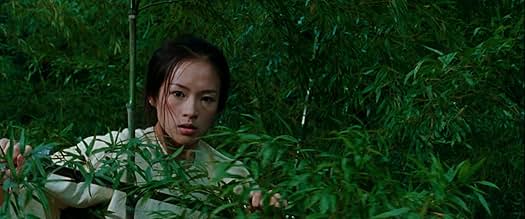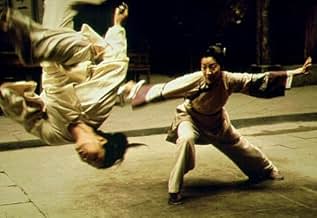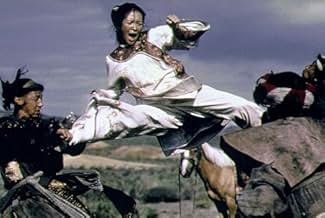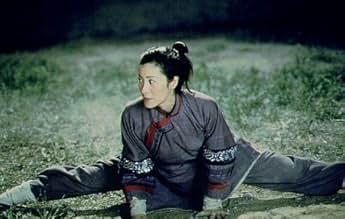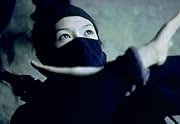Uma jovem guerreira chinesa rouba uma espada de um famoso espadachim e foge para um mundo de aventura romântica com um homem misterioso na fronteira do país.Uma jovem guerreira chinesa rouba uma espada de um famoso espadachim e foge para um mundo de aventura romântica com um homem misterioso na fronteira do país.Uma jovem guerreira chinesa rouba uma espada de um famoso espadachim e foge para um mundo de aventura romântica com um homem misterioso na fronteira do país.
- Direção
- Roteiristas
- Artistas
- Ganhou 4 Oscars
- 101 vitórias e 132 indicações no total
Chow Yun-Fat
- Master Li Mu Bai
- (as Chow Yun Fat)
Ziyi Zhang
- Jen
- (as Zhang Ziyi)
Pei-Pei Cheng
- Jade Fox
- (as Cheng Pei-Pei)
Deming Wang
- Tsai
- (as Wang De Ming)
Suying Huang
- Auntie Wu
- (as Huang Su Ying)
Jinting Zhang
- De Lu
- (as Zhang Jin Ting)
Jianhua Feng
- Gou Jun Sinung
- (as Feng Jian Hua)
Zhenxi Du
- Shop Owner
- (as Du Zhen Xi)
Cheng Lin Xu
- Captain
- (as Xu Cheng Lin)
Avaliações em destaque
What people who aren't Chinese and who don't know much about Chinese culture fail to understand, is that the warrior mythology portrayed in films like Crouching Tiger, Hidden Dragon and Hero has its roots in a particular genre of fiction that has been around much longer than television or film.
Having grown up reading a bunch of these stories of epic fantasy, I remember being surprised when I went to watch CTHD in the theaters, and saw the audience break out in laughter at the flying stunts. I suppose the concept probably does seem ridiculous to foreigners.
The whole deal with the flying is this:
In the stories, the world of "Giang Hu" mentioned in CTHD is the unconventional part of society in which the characters that practice high transcendent martial arts exist. "Giang Hu" literally translates to something like "lakes and rivers", which kind of is a cultural allusion to the fact that most of these people wander a whole lot participating in great duels of swordsmanship and all kinds of tragic drama.
One of the forms of transcendent martial arts is "chin guon", which translates to something like "the art of lightness". It's a skill that these warrior folk develop from a young age using various methods that make it so they can move as if they were light as a feather. I think the idea is that they're trained so that they progressively have less and less of a perception of their own weight, and thus they can run up walls and fly across rooftops in style.
There's another type of martial art which involves transmitting "chi" (spiritual essence or whatever you want to call it) through your hands or fingertips and into the pressure points of others, either doing them harm, rendering them unable to move, or restoring some of their strength.
If you don't understand that it's another culture's fiction/mythology and can't get over that it defies known physics and medicine etc., well, too bad.
At the same time, look at acupuncture. Millions swear by the benefits of acupuncture. Hell, my father had a stroke that paralyzed half his face and went to four separate doctors. They couldn't do a damn thing. He then went to an acupuncturist and after two sessions the paralysis was gone. Conventional medicine still has no idea how acupuncture could possibly work, yet a lot of doctors will accept it as a viable option. Who the hell knows, maybe once upon a time in China people could fly.
I find Chinese warrior mythology pretty interesting, and the problem is that these novels do not translate well. I'm not sure if anyone has ever tried. A lot of what goes on in them has a lot of cultural relevance and wouldn't be readily understood by certain people who have Western sensibilities. Hong Kong and Taiwan have for a couple of decades produced a lot of television shows that portray these stories, but they're mostly pretty cheesy like American soap operas.
Which is why CTHD is semi-important as a film. It's the first film to expose a lot Americans to this facet of Chinese mythology, and I hope it's not the last.
Having grown up reading a bunch of these stories of epic fantasy, I remember being surprised when I went to watch CTHD in the theaters, and saw the audience break out in laughter at the flying stunts. I suppose the concept probably does seem ridiculous to foreigners.
The whole deal with the flying is this:
In the stories, the world of "Giang Hu" mentioned in CTHD is the unconventional part of society in which the characters that practice high transcendent martial arts exist. "Giang Hu" literally translates to something like "lakes and rivers", which kind of is a cultural allusion to the fact that most of these people wander a whole lot participating in great duels of swordsmanship and all kinds of tragic drama.
One of the forms of transcendent martial arts is "chin guon", which translates to something like "the art of lightness". It's a skill that these warrior folk develop from a young age using various methods that make it so they can move as if they were light as a feather. I think the idea is that they're trained so that they progressively have less and less of a perception of their own weight, and thus they can run up walls and fly across rooftops in style.
There's another type of martial art which involves transmitting "chi" (spiritual essence or whatever you want to call it) through your hands or fingertips and into the pressure points of others, either doing them harm, rendering them unable to move, or restoring some of their strength.
If you don't understand that it's another culture's fiction/mythology and can't get over that it defies known physics and medicine etc., well, too bad.
At the same time, look at acupuncture. Millions swear by the benefits of acupuncture. Hell, my father had a stroke that paralyzed half his face and went to four separate doctors. They couldn't do a damn thing. He then went to an acupuncturist and after two sessions the paralysis was gone. Conventional medicine still has no idea how acupuncture could possibly work, yet a lot of doctors will accept it as a viable option. Who the hell knows, maybe once upon a time in China people could fly.
I find Chinese warrior mythology pretty interesting, and the problem is that these novels do not translate well. I'm not sure if anyone has ever tried. A lot of what goes on in them has a lot of cultural relevance and wouldn't be readily understood by certain people who have Western sensibilities. Hong Kong and Taiwan have for a couple of decades produced a lot of television shows that portray these stories, but they're mostly pretty cheesy like American soap operas.
Which is why CTHD is semi-important as a film. It's the first film to expose a lot Americans to this facet of Chinese mythology, and I hope it's not the last.
Fans burnt by George Lucas' "Phantom Menace" found solace in Ang Lee's cosily straightforward "Crouching Tiger Hidden Dragon". The film was greeted with a shrug in China (it was a flop), a country desensitised to wuxia tales, but Westerners loved it. Probably because "Tiger" is basically "Star Wars", with its own assortment of bounty-hunters, Jedis, Sith Lords, princesses, rogues, warriors, villains, henchmen, Yodas, fairy tale romances, teachers, masters, apprentices, chosen ones and much vague talk of destiny, fate and "light" and "dark" sides. When he's not indulging in super choreographed action sequences, Lee's aesthetic is also very Lucasy, which is to say, very John Ford, very David Lean, very Kurosawa, with clean lines, big open spaces, and simple but careful shot selection. What's strange is the film's budget. The film looks like it has the budget of one of those big, state backed Chinese or Stalinist productions, but "Crouching" was made for about fifteen million dollars. Lee gets a lot of mileage out of his budget.
Martial arts fans abhor "Tiger". It's too geared to western tastes, too watered down, and China's been churning out similar wuxia for decades. Why should this one get all the credit? But Lee does put his own spin on the material. His film is more sensual, poetic, graceful, romantic, has a mysterious beauty, and is more delicate than is typical of the genre. His female characters are also given a bigger role than is customary and his action at times seems more like expressive dance.
Repression, restrictions, strict moral codes and self-control are an obsession with Lee. With "Hulk" we had a scientist who struggles to curb his anger, his "Taking Woodstock", "Wedding Banquet" and "Brokeback Mountain" revolved around characters repressing their homosexuality, while "Sense and Sensibility", "Lust Caution", "Ice Storm" and "Woodstock" again all hinged on either repression, free expression or the inhibiting of desire. In "Crouching's" case – the title itself refers to "one who has hidden, suppressed talents" - we have a stifled three-way love between characters called Mu Bai, Shu Lien and Jen Yu, all of whom are prohibited from desire by strict moral/social codes, feudal customs and warrior traditions.
The rejection of these codes is perhaps why the film was shunned by China (and is so popular with western women). Chinese mythology, Taoist philosophy and the hokey "mysticism" of Asian martian arts films (akin to "Star Wars'" "The Force"), all stress an esoteric mode of detachment, a form of denial characteristic of Eastern thought in which the world is seen to be illusory and detached cogitation is seen to be the path to enlightenment. Lee, in contrast, is trading in a more genteel, Western sensibility; a kind of romantic humanism where one is called to ditch Eastern stoicism and embrace the "reality" and "meaning" of human attachments in this life. This tug-of-war is epitomised by a trio of conversations located in each of the film's three acts. In the first, characters called Mu Bai and Shu Lien, who we learn have long had feelings for each another but have denied these feelings to pursue the demands of a Wudan warrior lifestyle, discuss the fact that Mu Bai, when meditating, reaches not "the bliss of enlightenment" but "a place of endless sorrow". For Mu Bai, passions cannot be extinguished and only serve to increase the pull of desire. Mu Bai's conflict – the way clinging to personal affection is contrary to his Wudan ways of detachment – can be found even in Lucas' "Star Wars" prequels, only there Lucas has some monastic ninja kid literally moan about the way his calling prevents him from losing his virginity ("Me want make sexy time but Yoda say no! Wah Wah Wah!").
The second conversation occurs at the film's midpoint, when Mu Bai and Shu Lien finally touch. "Shu Lien," he recoils, "the things we touch have no permanence. My master would say there is nothing we can hold onto in this world. Only by letting go can we truly possess what is real." Shu Lien then brushes aside his Taoism with direct, naive realism: "Not everything is an illusion. My hand is real."
It's in the third conversation that the film breaks away from your typical martial arts movie mysticism and repudiates Wudan philosophy. Here, Mu Bai is dying and Shu Lien urges him to meditate: "Free yourself of this world. Let your soul rise to eternity. Do not waste your breath on me." "I have already wasted my life," Mu Bai responds. "I would rather be a ghost drifting by your side, as a condemned soul, than enter heaven without you." Contrast this with the countless marital arts movies, or even the "Star Wars" franchise, which end with the ghostly spirits of dead warriors, monks and masters hovering contently over the living. Mu Bai is given no supernatural reprieve, no higher plane of existence. He just dies. The film then ends with the recounting of a mountain legend in which a young woman must paradoxically "float away and never return" if she wishes to "return". The whole film hinges on a similar paradox: acting on a desire one desires not to have. It's the paradox of Buddhism: continually desiring to eliminate desire, whereby satiating desire is impossible and it is ultimately desire which blocks the road to desirelessness. This is contrasted with a more Western hedonism, where the hedonist attempts the cessation of desire by "giving in" to them all.
Beyond all this, the film resembles the works of King Hu, Ozu and Ichikawa, the latter two only insofar as it contrasts straitjacketed older generations, and their societal obligations, with oppositional, younger generations. The film's ending suggests that a character called Jen sacrifices her life/love so that Mu Bai and Shu Lien may finally be together.
8.5/10 – Worth two viewings.
Martial arts fans abhor "Tiger". It's too geared to western tastes, too watered down, and China's been churning out similar wuxia for decades. Why should this one get all the credit? But Lee does put his own spin on the material. His film is more sensual, poetic, graceful, romantic, has a mysterious beauty, and is more delicate than is typical of the genre. His female characters are also given a bigger role than is customary and his action at times seems more like expressive dance.
Repression, restrictions, strict moral codes and self-control are an obsession with Lee. With "Hulk" we had a scientist who struggles to curb his anger, his "Taking Woodstock", "Wedding Banquet" and "Brokeback Mountain" revolved around characters repressing their homosexuality, while "Sense and Sensibility", "Lust Caution", "Ice Storm" and "Woodstock" again all hinged on either repression, free expression or the inhibiting of desire. In "Crouching's" case – the title itself refers to "one who has hidden, suppressed talents" - we have a stifled three-way love between characters called Mu Bai, Shu Lien and Jen Yu, all of whom are prohibited from desire by strict moral/social codes, feudal customs and warrior traditions.
The rejection of these codes is perhaps why the film was shunned by China (and is so popular with western women). Chinese mythology, Taoist philosophy and the hokey "mysticism" of Asian martian arts films (akin to "Star Wars'" "The Force"), all stress an esoteric mode of detachment, a form of denial characteristic of Eastern thought in which the world is seen to be illusory and detached cogitation is seen to be the path to enlightenment. Lee, in contrast, is trading in a more genteel, Western sensibility; a kind of romantic humanism where one is called to ditch Eastern stoicism and embrace the "reality" and "meaning" of human attachments in this life. This tug-of-war is epitomised by a trio of conversations located in each of the film's three acts. In the first, characters called Mu Bai and Shu Lien, who we learn have long had feelings for each another but have denied these feelings to pursue the demands of a Wudan warrior lifestyle, discuss the fact that Mu Bai, when meditating, reaches not "the bliss of enlightenment" but "a place of endless sorrow". For Mu Bai, passions cannot be extinguished and only serve to increase the pull of desire. Mu Bai's conflict – the way clinging to personal affection is contrary to his Wudan ways of detachment – can be found even in Lucas' "Star Wars" prequels, only there Lucas has some monastic ninja kid literally moan about the way his calling prevents him from losing his virginity ("Me want make sexy time but Yoda say no! Wah Wah Wah!").
The second conversation occurs at the film's midpoint, when Mu Bai and Shu Lien finally touch. "Shu Lien," he recoils, "the things we touch have no permanence. My master would say there is nothing we can hold onto in this world. Only by letting go can we truly possess what is real." Shu Lien then brushes aside his Taoism with direct, naive realism: "Not everything is an illusion. My hand is real."
It's in the third conversation that the film breaks away from your typical martial arts movie mysticism and repudiates Wudan philosophy. Here, Mu Bai is dying and Shu Lien urges him to meditate: "Free yourself of this world. Let your soul rise to eternity. Do not waste your breath on me." "I have already wasted my life," Mu Bai responds. "I would rather be a ghost drifting by your side, as a condemned soul, than enter heaven without you." Contrast this with the countless marital arts movies, or even the "Star Wars" franchise, which end with the ghostly spirits of dead warriors, monks and masters hovering contently over the living. Mu Bai is given no supernatural reprieve, no higher plane of existence. He just dies. The film then ends with the recounting of a mountain legend in which a young woman must paradoxically "float away and never return" if she wishes to "return". The whole film hinges on a similar paradox: acting on a desire one desires not to have. It's the paradox of Buddhism: continually desiring to eliminate desire, whereby satiating desire is impossible and it is ultimately desire which blocks the road to desirelessness. This is contrasted with a more Western hedonism, where the hedonist attempts the cessation of desire by "giving in" to them all.
Beyond all this, the film resembles the works of King Hu, Ozu and Ichikawa, the latter two only insofar as it contrasts straitjacketed older generations, and their societal obligations, with oppositional, younger generations. The film's ending suggests that a character called Jen sacrifices her life/love so that Mu Bai and Shu Lien may finally be together.
8.5/10 – Worth two viewings.
Crouching in the shadows, hiding in the dark, entangled with emotion, an unobtrusive heart, waiting for a moment that may never be revealed, the chance to draw back shades, unlock its passions, remove its seals.
Seamlessly flowing like water over weathered stone, as elegant and enchanting a tale of right verses wrong, good verses bad, learning and forgiving as you'll likely find. The cinematography is sublime, the acting and performances as good as they get, the message as simple as any placed on a screen. Immerse yourself in a truly wonderful piece of cinema that perpetually stands the test of time.
Seamlessly flowing like water over weathered stone, as elegant and enchanting a tale of right verses wrong, good verses bad, learning and forgiving as you'll likely find. The cinematography is sublime, the acting and performances as good as they get, the message as simple as any placed on a screen. Immerse yourself in a truly wonderful piece of cinema that perpetually stands the test of time.
As Ang Lee, I grew up reading wuxia novels in Taiwan. Those novels usually mixed engrossing history, thrilling action, enchanting romance. But when these novels were made into movies or TV series, none of them could match my imagination. It's either because of wrong casting, bad acting, tedious costumes, sloppy storytelling, minimal budget (so everything is shot in studio rather than in the grand Chinese landscapes as they were told in books), fake action... I could go on and on. Now Ang Lee finally made a wuxia film that captures my imagination and fulfills my dream of childhood.
The casting of CTHD is perfect. No disrespect to Jet Li, but Jet Li would not make Li Mu Bai into what he should be: noble, wise but weary. Chow Yun Fat conveys the unspoken feelings of Li Mu Bai in a way I can't imagine anyone else can. But he's known for his acting, Michelle Yeoh was known for her fighting skills. Here in CTHD, she proves herself as an excellent dramatic actress. The secrete longing for Li and the confusion of Li's true feelings were clearly conveyed by her eyes. The scenes between them are heartbreaking. Zhang Zi Yi is a true discovery! What a wonderful talent to steal scenes after scenes from the veterans around her. She ran from looking innocent, haughty, feisty to loving and distraught. She made the complex Jen a real flesh and blood believable human being. Chang Chen made a perfectly sexy and charming bandit.
The scenery and the photography was beyond belief. The majestic landscapes of China match my imagination when I read all the beautiful Chinese poems of the Tang and Sung dynasties. No wonder those poets could come up with those masterpieces. They sure had the best inspiration. Peter Pau not only captured the landscapes and the settings, he also managed to capture the fast-as-lightening action wonderfully. The shot of Jen gliding over water just lodged in my mind. The soundtrack is also excellent. Tan Dun used different instruments to match the different locales. He mixed in Central Asian music in the desert sequence and Chinese flute in the Southern China scenes. Yo-yo Ma's cello in the main theme makes me want to weep everytime I hear it.
The storytelling was also done expertly. As a romantic-at-heart, I love the desert romance between Jen and Lo. It's one of the most charming and believable love stories that I can remember. Most people gave credit of the fighting to Yuen Wo Ping. I'd give kudos to Ang Lee. I've seen Yuen's martial art films before, but they're never done in such an imaginative and artistic way. The artistic vision has to come from Ang Lee.
To sum it up, three cheers for Ang Lee! You not only fulfilled your childhood dream, you fulfilled mine too. It's such a pleasure to finally see a wuxia novel be done right. Thank you! Thank you! Thank you!
The casting of CTHD is perfect. No disrespect to Jet Li, but Jet Li would not make Li Mu Bai into what he should be: noble, wise but weary. Chow Yun Fat conveys the unspoken feelings of Li Mu Bai in a way I can't imagine anyone else can. But he's known for his acting, Michelle Yeoh was known for her fighting skills. Here in CTHD, she proves herself as an excellent dramatic actress. The secrete longing for Li and the confusion of Li's true feelings were clearly conveyed by her eyes. The scenes between them are heartbreaking. Zhang Zi Yi is a true discovery! What a wonderful talent to steal scenes after scenes from the veterans around her. She ran from looking innocent, haughty, feisty to loving and distraught. She made the complex Jen a real flesh and blood believable human being. Chang Chen made a perfectly sexy and charming bandit.
The scenery and the photography was beyond belief. The majestic landscapes of China match my imagination when I read all the beautiful Chinese poems of the Tang and Sung dynasties. No wonder those poets could come up with those masterpieces. They sure had the best inspiration. Peter Pau not only captured the landscapes and the settings, he also managed to capture the fast-as-lightening action wonderfully. The shot of Jen gliding over water just lodged in my mind. The soundtrack is also excellent. Tan Dun used different instruments to match the different locales. He mixed in Central Asian music in the desert sequence and Chinese flute in the Southern China scenes. Yo-yo Ma's cello in the main theme makes me want to weep everytime I hear it.
The storytelling was also done expertly. As a romantic-at-heart, I love the desert romance between Jen and Lo. It's one of the most charming and believable love stories that I can remember. Most people gave credit of the fighting to Yuen Wo Ping. I'd give kudos to Ang Lee. I've seen Yuen's martial art films before, but they're never done in such an imaginative and artistic way. The artistic vision has to come from Ang Lee.
To sum it up, three cheers for Ang Lee! You not only fulfilled your childhood dream, you fulfilled mine too. It's such a pleasure to finally see a wuxia novel be done right. Thank you! Thank you! Thank you!
Chinese martial arts films had found a market in the West during the Kung Fu boom initiated by Bruce Lee in the early 1970s
But "Crouching Tiger, Hidden Dragon" represents a new departure, an attempt to produce a sophisticated, big-budget Chinese film that would appeal both to mainstream Western audiences and to audiences in the Far East
Through their quest to find the stolen sword of Green Destiny, warriors Yu Shu Lien (Michelle Yeoh) and Li Mu Bai (Chow Yun-Fat) explore themes of love, loyalty and sacrifice
Ang Lee was an astute choice as director The location shooting was on the Chinese mainland and the actors came from Malaysia, Hong Kong and Taiwan, as well as China Instead of the Shaolin school of martial arts favored by Bruce Lee, Ang Lee opted for the more spiritual form of Wudan; brute force is replace by scenes of balletic grace as opponents climb up walls or flit through tree-tops
The widespread success of the film is a firm indication that Chinese culture is making its mark
Ang Lee was an astute choice as director The location shooting was on the Chinese mainland and the actors came from Malaysia, Hong Kong and Taiwan, as well as China Instead of the Shaolin school of martial arts favored by Bruce Lee, Ang Lee opted for the more spiritual form of Wudan; brute force is replace by scenes of balletic grace as opponents climb up walls or flit through tree-tops
The widespread success of the film is a firm indication that Chinese culture is making its mark
Você sabia?
- CuriosidadesMichelle Yeoh deliberately did not work for a year before filming began so she could concentrate on training and learning Mandarin.
- Erros de gravação(at around 1h 30 mins) During the fight between Yu Shu Lien and Xiou Long, many floor tiles are smashed by Shu Lien. After Shu Lien discards her heavy metal weapon and continues to fight, the tiles appear intact.
- Cenas durante ou pós-créditosThe opening title appears in Chinese and English.
- Versões alternativasAn English dubbed version was created for the home video market.
- Trilhas sonorasA Love Before Time
Music Composed by Jorge Calandrelli, Dun Tan
Lyrics by James Schamus, Elaine Chow (Translation)
Performed by Coco Lee featuring Cello Solo by Yo-Yo Ma
Coco Lee appears courtesy of Sony Music Entertainment (Holland) B.V.
Principais escolhas
Faça login para avaliar e ver a lista de recomendações personalizadas
Detalhes
- Data de lançamento
- Países de origem
- Central de atendimento oficial
- Idiomas
- Também conhecido como
- El tigre y el dragón
- Locações de filme
- Empresas de produção
- Consulte mais créditos da empresa na IMDbPro
Bilheteria
- Orçamento
- US$ 17.000.000 (estimativa)
- Faturamento bruto nos EUA e Canadá
- US$ 128.530.421
- Fim de semana de estreia nos EUA e Canadá
- US$ 663.205
- 10 de dez. de 2000
- Faturamento bruto mundial
- US$ 213.978.518
- Tempo de duração2 horas
- Cor
- Mixagem de som
- Proporção
- 2.39 : 1
Contribua para esta página
Sugerir uma alteração ou adicionar conteúdo ausente


